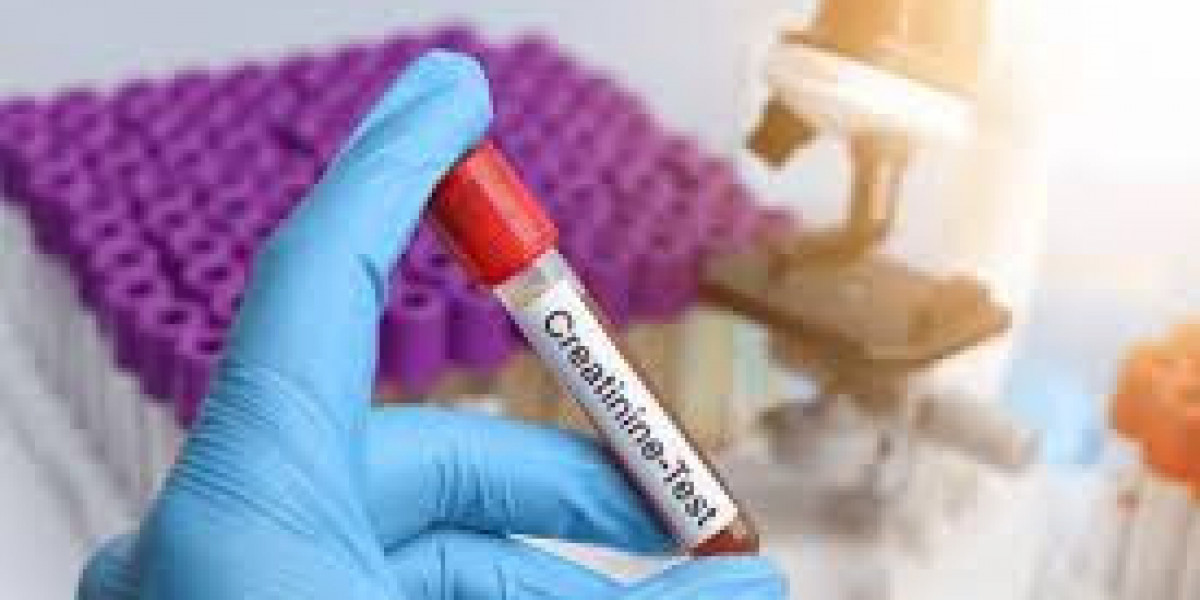Creatinine is a waste product generated from the normal wear and tear of muscles during energy production. It is continuously produced and released into the bloodstream. Healthy kidneys are responsible for filtering creatinine out of the blood and expelling it from the body through urine.
The Creatinine Test in Chennai, typically measuring the serum creatinine (creatinine level in blood), is primarily used to:
Assess Kidney Health: It's a fundamental indicator of how well your kidneys are performing their filtration duties.
Diagnose Kidney Disease: Elevated creatinine levels often signify that the kidneys are not filtering waste efficiently, potentially indicating kidney damage or disease.
Monitor Kidney Conditions: For individuals already diagnosed with kidney problems, regular creatinine tests help track the progression of the disease and evaluate the effectiveness of ongoing treatment.
Check Medication Side Effects: Certain medications can affect kidney function, and this test helps monitor for any adverse effects.
Evaluate Kidney Transplant Function: For transplant recipients, creatinine levels are crucial to assess the health and function of the transplanted kidney.
Calculate eGFR (Estimated Glomerular Filtration Rate): Creatinine levels are a key component in calculating eGFR, which provides a more precise measure of kidney function, indicating how quickly your kidneys filter waste from your blood. This calculation considers factors like age, sex, and sometimes weight.
When Might a Doctor Recommend a Creatinine Test?
Your healthcare provider in Chennai may recommend a creatinine test for several reasons:
Routine Health Check-ups: As a standard part of preventive health screenings.
Symptoms of Kidney Disease: If you experience symptoms such as:
Swelling in hands, feet, or ankles
Fatigue or weakness
Changes in urination patterns (increased or decreased frequency, foamy or bloody urine)
Muscle cramps
Loss of appetite, nausea, or vomiting
Dry, itchy skin, or numbness
Difficulty sleeping or concentrating
High-Risk Individuals: If you have conditions that increase the risk of kidney disease, even without current symptoms. These include:
Diabetes
High blood pressure
Heart disease
A family history of kidney disease
Obesity
Being over 50 years of age
Smoking history
Before Certain Medical Procedures or Medications: To assess baseline kidney function or if you are starting medications known to affect kidneys.
What to Expect During a Creatinine Test?
The Creatinine Test is a straightforward procedure:
Procedure: It primarily involves a blood test. A healthcare professional will draw a small blood sample, usually from a vein in your arm, using a small needle.
Preparation: Generally, no special preparation or fasting is required for a blood creatinine test. You can eat and drink normally before the test. However, it is vital to inform your doctor about all medications and supplements you are currently taking, as some substances (e.g., certain antibiotics, H2 blockers, or large doses of Vitamin C supplements) can potentially affect the test results. Your doctor will advise if any temporary adjustments are needed.
Urine Test: In some cases, a 24-hour urine creatinine test might also be ordered. For this, you will collect all your urine over a 24-hour period in a special container provided by the facility. This helps assess how much creatinine your kidneys are actually clearing from your body.
Discomfort and Recovery: You might feel a brief pinch or sting during the blood draw, but discomfort is usually minimal. After the blood draw, you can typically resume your normal activities immediately.
Results: Test reports are usually available within 24 to 48 hours, depending on the diagnostic facility.
Understanding Your Creatinine Levels
The interpretation of creatinine levels often involves considering your age, sex, muscle mass, and overall health status. General reference ranges for serum creatinine are:
Adult Men: Approximately 0.7 to 1.3 mg/dL (61.9 to 114.9 µmol/L)
Adult Women: Approximately 0.6 to 1.1 mg/dL (53 to 97.2 µmol/L)
Important Notes:
Higher than normal creatinine levels may indicate reduced kidney function, dehydration, muscle problems, or certain medications.
Lower than normal creatinine levels are less common and may be associated with very low muscle mass, malnutrition, or certain liver conditions.
Your doctor will interpret your creatinine level in conjunction with your eGFR and other kidney function tests (like BUN, Blood Urea Nitrogen) to provide a comprehensive assessment of your kidney health.
Getting Your Creatinine Test in Chennai: Accessibility and Quality
Chennai, being a major medical hub, offers extensive access to high-quality diagnostic services for creatinine testing:
Numerous Diagnostic Centers: The city hosts a large number of well-established diagnostic centers and pathology labs across all localities. These facilities are equipped with modern technology and staffed by experienced professionals.
Hospital Laboratories: Most large multi-specialty hospitals in Chennai have their own in-house pathology laboratories that offer creatinine testing as part of their comprehensive diagnostic services.
Home Sample Collection: For added convenience, many diagnostic providers in Chennai offer home sample collection services. A trained phlebotomist can visit your home to collect the blood sample, making the process comfortable and time-efficient.
Quality Assurance: It is highly recommended to choose laboratories that are NABL (National Accreditation Board for Testing and Calibration Laboratories) accredited. This accreditation ensures that the lab adheres to stringent quality control standards, guaranteeing the accuracy and reliability of your test results.
Conclusion
Monitoring your kidney health through a creatinine test is a crucial step in proactive healthcare, especially in an urban environment like Chennai. Early detection of any anomalies in kidney function allows for timely intervention, helps manage underlying conditions more effectively, and ultimately contributes to maintaining your long-term health and quality of life. If you have any concerns about your kidney health or if your doctor recommends it, do not hesitate to get a creatinine test done at a reputable facility in Chennai.














